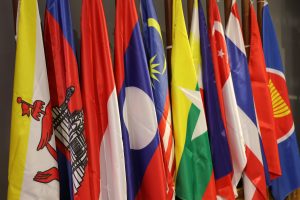On February 1, we marked the one-year anniversary of the start of one of the worst crises in Southeast Asia’s recent history: the failed military coup in Myanmar. Led by Senior General Min Aung Hlaing, the illegal junta has now spent one year devastating the country, waging a campaign of extreme violence and terror against the population.
The past year has also exposed the limits of the Association of Southeast Asian Nations’ (ASEAN) ability to protect its own people. Riven by internal divisions, the bloc has failed to take coherent and decisive action in response to Min Aung Hlaing’s atrocities. And now ASEAN faces a seemingly “perfect storm” of challenges to navigate in its efforts to deal with the murderous miliary junta.
The current ASEAN chair, Cambodian dictator Hun Sen, has made a series of blunders since assuming the role in January. His ill-advised visit to Naypyidaw – made without consulting other ASEAN member states – was predictably exploited by Min Aung Hlaing and resulted in nothing more than a reality-bending joint statement that served as a PR exercise for the junta. Hun Sen was burned a second time when he was forced to apologize for wrongly announcing that Australian economic advisor Sean Turnell had been released. Turnell remains, after a year, unjustly detained by the junta.
Meanwhile, the U.N. secretary general’s recently appointed Special Envoy to Myanmar, Noeleen Heyzer, a critical partner for ASEAN, has been massively set back in her initial efforts after making an ill-judged proposal for a power sharing with the military as a way forward.
As for Min Aung Hlaing himself, he is deluded. He has no authority over the country. Significant territory is under the control of the allied democratic forces – the National Unity Government (NUG), ethnic administrations, and protest groups. Yet the general is digging in his heels, intransigent to this reality, and intensifying his violence.
But there is still hope. As the ASEAN foreign ministers meet in Phnom Penh this week, they must seize the moment and return ASEAN to the more principled course it had begun to take before the New Year.
In October, ASEAN took the unprecedented step of barring Min Aung Hlaing and reducing Myanmar to non-political representation at the annual ASEAN Summit. There can be no more fatal blow to a would-be regime than being diminished to a non-political status. This was an important move by ASEAN toward waiving the obsolete principle of non-interference, which has long rendered itself impotent in the face of the Myanmar military’s brutality. ASEAN’s act of effectively rendering the detested junta delegitimated in the eye of its people has helped to energize the democracy movement to completely rid itself of it.
This week’s ASEAN Foreign Ministerial Meeting is an opportunity to get back on this track. The fact that the junta will once again not be welcome at the meeting is a sign that there is still some moral clarity left within the bloc.
ASEAN must now recognize that Myanmar is going through a historic process of remodelling itself as a federal democratic nation, free from the military’s violence and oppression. History shows us that once a country starts on this path, nothing can stop it. In the short term, however, the people of Myanmar need international support to get there – not least from their own neighbors.
The foreign ministers need to take immediate and united action. They must resolve for ASEAN and the ASEAN special envoy to engage meaningfully and publicly with the National Unity Government (NUG) and other democratic actors as the real representatives of the people of Myanmar – this is crucial when it comes to the urgent delivery of humanitarian aid, which should be channelled across borders, directly to the people and not through the military.
Critically, ASEAN must not be fooled by token gestures from Min Aung Hlaing or allow him leeway to dictate the terms of any eventual dialogue process. Nothing short of a genuine political transformation in line with the principles of the Federal Democratic Charter announced by the people’s elected representatives in March last year can resolve this crisis and end ASEAN’s decades-long Myanmar headache.
The people of Myanmar have bravely – and successfully – withstood the coup over the past year, at a heavy, heavy cost. Now ASEAN must show it is on the right side of history by throwing its weight behind Myanmar’s new democracy.
































